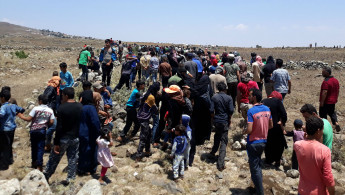Russian airstrike kills Syrians marching in Golan Heights
Dozens of Syrians displaced by a government offensive marched toward the Israel-occupied Golan Heights in a rare peaceful protest on Tuesday, shortly after a suspected Russian airstrike hit a school serving as a shelter in southwestern Syria, killing at least 10 people, according to activists.
The brief protest came as Syrian and Russian airstrikes intensified in the Quneitra countryside and the southwestern Daraa province.
Tuesday's airstrike hit in the village of Ain el-Tineh in Quneitra province, about 7 kilometres (4 miles) from the Israeli frontier, according to a Syrian search and rescue team.
Khaled Solh of the Syrian Civil Defence group, also known as the White Helmets, said the building was being used to shelter families that were forced to flee their homes amid the fighting in southwestern Syria.
He blamed the airstrike on Russia, Syrian President Bashar al-Assad's top ally.
The Britain-based Syrian Observatory for Human Rights, which monitors Syria's civil war through a network of activists on the ground, put the death toll from the airstrike at 14, including four women and five children.
The Observatory said 180 civilians have been killed in fighting in the region since June 19.
Syrian regime troops, backed by Russian forces, have stepped up their viscious attacks on the remaining opposition pockets in the region, launching over 1,500 shells and airstrikes in the last two days alone, according to the Observatory.
No shelter
But Moaz al-Assaad, a photographer in Quneitra, said by the time he made it to the frontier with Israel, the protesters had dispersed. Israeli media reported that Israeli soldiers shouted through loudspeakers, asking the crowd to turn back.
Earlier, al-Assaad also said that he counted at least 20 wounded at the scene of the airstrike, including children.
The International Rescue Committee said the government's advance in southwestern Syria has trapped tens of thousands of displaced Syrians along the frontier with the Golan Heights, which Israel occupied in 1967.
The aid group said there are urgent concerns for the safety of around 160,000 people who fled to the area earlier this month and are now caught between the frontier and the advancing Syrian army.
The IRC estimated that around 5 percent of the displaced people are living out in the open with only trees to provide shelter.
"There really is nowhere else for these people to go and seek safety," said the IRC's Mark Schnellbaecher. "They can hear the fighting getting closer and worry it's only a matter of time before the front line reaches them."
The United Nations said last week that over 230,000 people have been displaced since June 17 in southwestern Syria, which borders Jordan and the Golan Heights. Jordan has said it will not open its borders to the newly displaced Syrians.
Since June, Syrian troops and allied forces have seized control of most of the southwestern Daraa province, including the provincial capital of the same name. The city of Daraa was the cradle of the uprising against Assad seven years ago.
As Syrian forces advanced and the rebels were overpowered, they struck deals with the government under which hundreds of rebel fighters and their families were evacuated to northern Syria.





 Follow the Middle East's top stories in English at The New Arab on Google News
Follow the Middle East's top stories in English at The New Arab on Google News
![Israeli forces ordered bombed Gaza's Jabalia, ordering residents to leave [Getty]](/sites/default/files/styles/image_330x185/public/2176418030.jpeg?h=a5f2f23a&itok=_YGZaP1z)

